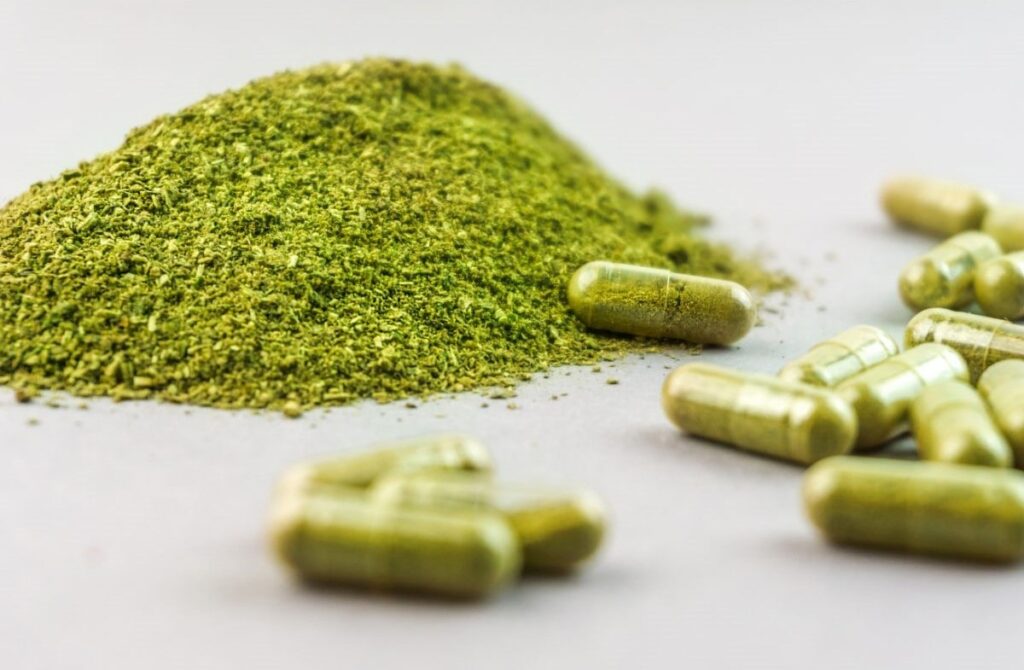Written By: Erika Dalton, LCSW
Medically Reviewed By: Dr. Rahul Gupta, MD
Last Updated: June 10, 2024
Kratom has made a splash recently in the United States, making its way across the country and causing addiction to this potentially dangerous drug. Because it’s fairly new, even people who use it may have a lot of questions about it, such as “Does kratom show up on a drug test?”
At Buckhead Behavioral Health, we understand how kratom abuse impacts a person’s life to the point that they need professional treatment. We offer multi-disciplinary rehab programs in Atlanta that address the urge to use drugs and teach people to resist relapse. Using different types of therapy also helps people heal underlying mental health issues, such as anxiety or depression, that can contribute to becoming addicted to kratom.
If you or a loved one is struggling with addiction to Kratom, reach out to us now at (470) 460-6789. Our rehab for Kratom can help you get off of this addictive substance and create a new life for yourself.
What is Kratom? (And Is It An Addictive Drug?)
Kratom is a drug with its origins in Southeast Asia that comes from manufacturing the leaves of a tree in that area called mitragyna speciosa. People in that region of the world began using kratom to help treat medical conditions such as diarrhea, pain, coughing, and exhaustion. Others used it as a stimulant drug to help increase their energy levels.
In the U.S., kratom is primarily used as a stimulant drug, similar to other narcotics such as amphetamines and cocaine. It helps people stay awake for extended periods of time, which they may use to help study for exams in college or as part of a social routine of being up all night. Kratom also is known for helping some people feel more at ease when interacting socially with others.
Currently, kratom is classified as a legal drug in this country, but that may soon change. The Drug Enforcement Agency (DEA) filed kratom in the category of a drug of concern. This means further studies must be done to understand its full impact, and there is a strong likelihood it will be reclassified as illegal.
For now, the DEA warns that people avoid using kratom. Someone who finds themselves wondering, “Does kratom show up on a drug test?” may already be on the road to a full-blown addiction.

Recommended: How Addictive Is Kratom?
Does Kratom Show Up on a Drug Test?
If kratom will show up on a drug test depends on a few factors, including how long ago the person took it and how much they used. It also depends on the type of drug test administered. If a prospective employer or someone else gives a 5-panel drug test, it will look for signs of drug use from the following substances: marijuana, opiates, cocaine, amphetamines, and PCP. Kratom will not show up on this drug test.
However, if the test administered is a 10-panel drug test, kratom may show up on the drug test. The 10-panel drug test looks for the same drugs as the 5-panel test along with barbiturates, benzodiazepines, methadone, methaqualone, and propoxyphene.
How the drug test is administered can also affect the results. A urine test may show kratom usage for up to a week after the last dosage. Kratom is only detectable via a blood test for a couple of days after last using it. Finally, kratom is not typically detectable in saliva tests or hair tests.
Signs of Kratom Addiction
Once someone has developed a kratom addiction, they will show signs of it. Some of the most common symptoms of addiction to kratom include:
- Hyperactivity
- Excessive amounts of energy
- Going long periods without sleep
- Weight loss
- Lack of appetite
- Hallucinations
- Psychosis
- Feeling uncomfortable in social situations without using kratom
- Frequent urination
- Itchy skin
- Nausea and vomiting
- Diarrhea
- Constipation
- Sweating
- Seizures
- Often appearing or acting sedated
- Excessive sleeping

Recommended: What Are the Side Effects of Kratom Abuse?
How is Kratom Addiction Treated?
Kratom addiction can take place at a residential facility, where a person lives for several weeks and receives 24/7 care. On the other hand, some people find that outpatient care provides the focused support they need, starting with a drug detox program to manage kratom withdrawal symptoms safely.
After detox, outpatient programs include partial hospitalization programs (PHP), which require attendance for full days of sessions many times per week. Another option is intensive outpatient programs (IOP), which take place for a few hours per day a few days per week. Some IOP plans can be done in the evening or virtually to meet the needs of varying schedules people have.
Attending more than one type of therapy gives people the best opportunity to address the reasons behind their addiction and how to avoid relapsing. Many treatment plans include individual therapy, family therapy, holistic therapy, and more. Prescription medications can be taken that help ease kratom withdrawal symptoms and make the initial days of sobriety easier to endure.
Get Help for Kratom Addiction in Atlanta Today
Drug abuse can become a problem in anyone’s life. When it does, it’s imperative to get help quickly from a facility that understands the intricacies of addiction. If you find yourself wondering, “Does kratom show up on a drug test?”, you may have reached the point of having a substance use disorder.
Buckhead Behavioral Health can help you turn your life around because we provide life-changing assistance that teaches you to live a drug-free life. We guide you through a series of therapies designed to help people embrace sobriety for life. We can also offer prescription medications to help ease withdrawal symptoms that may occur.
If you are ready to face your reliance on kratom usage and put drug abuse in your past, visit our admissions page now. Our staff will be happy to explain how easy it is to enroll in our program and get healthy again.











